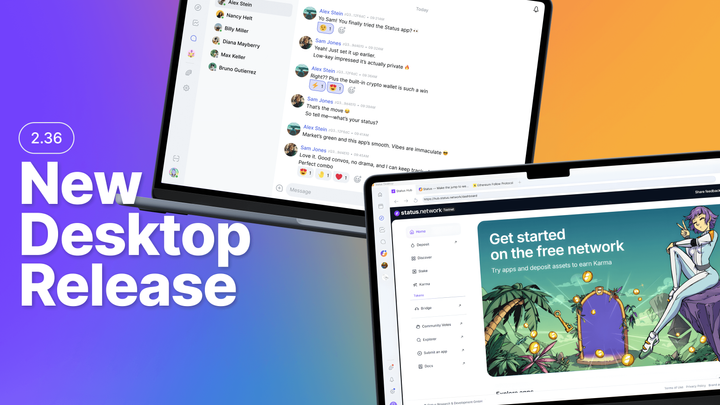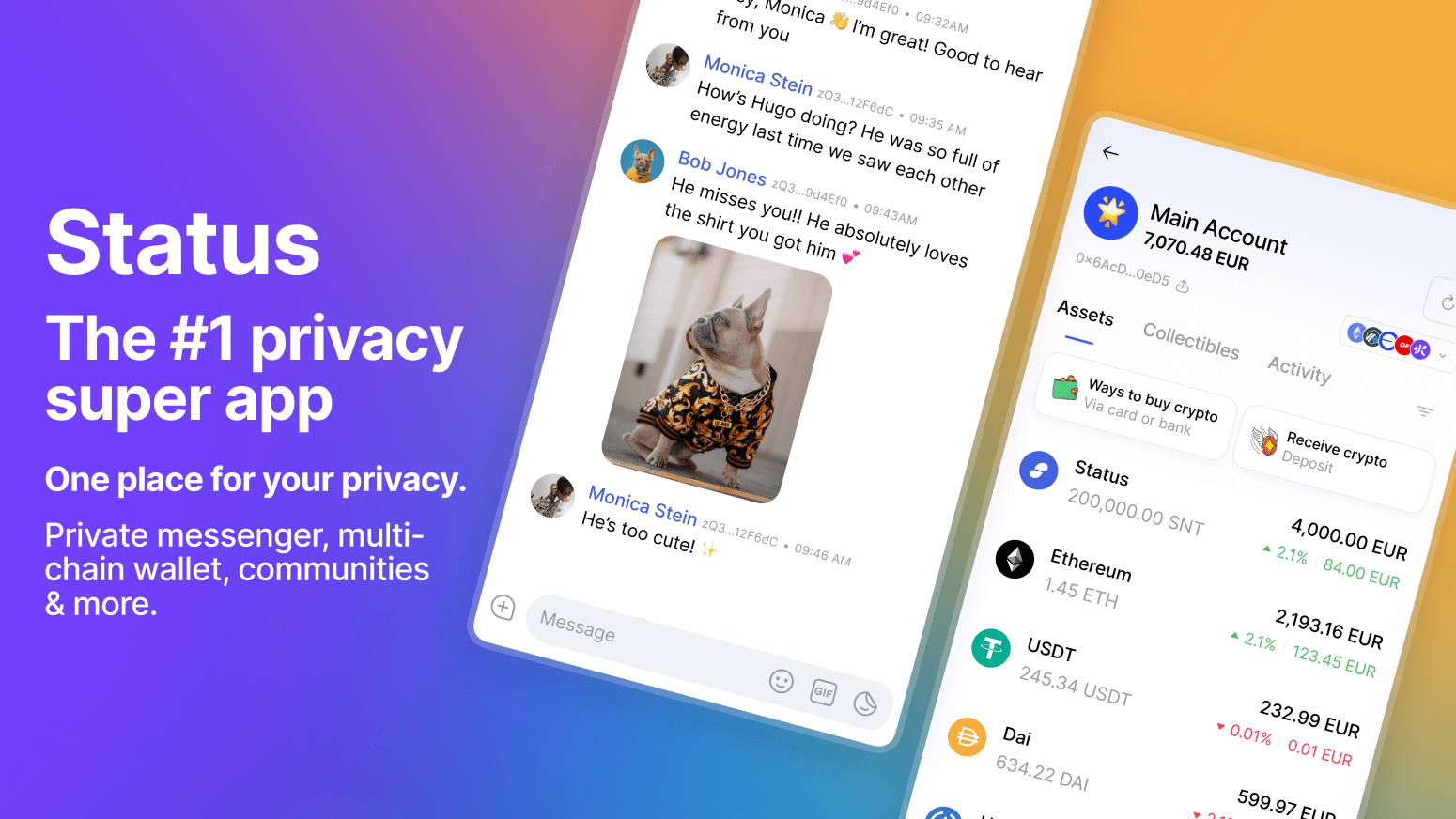Status Desktop's very first public beta preview release is finally here, and we can’t wait for you to download it from the Status website homepage and try it yourself! As you can tell from our GitHub repo, which is consistently among the most active in crypto, we’ve been working around the clock to deliver this application!
Just remember, this is Status Desktop’s very first public beta release, and it is just a preview of what we hope to deliver later this year. There are still a few big pieces of functionality missing, like DApp transaction signing, and there are still many bugs that we are working to fix. But combining a private messenger, multi-chain wallet, and Discord-like community group chat spaces (with native token gating, token minting, token airdropping, etc!) functionality into a single application is no mean feat.
Doing it all decentralised – without relying on central servers to store user and community information, relay messages, etc. – is even more challenging! We’re already aware of many bugs (and expect to discover many more!) that must be addressed before we declare Desktop ready for its first full non-beta public release.
This blog post gives a quick overview of what you can expect from Status Desktop, some precautions to take when interacting with this initial beta release, how to report any bugs you might encounter, how to request new features you want to see, and more information about Status Mobile 2.0’s upcoming first public beta preview release.
Status Desktop: A Feature-Rich, Decentralised Super App
Status Desktop is a platform that comes loaded with decentralised apps that connect you directly to web3 and other Status users, including:
- Messenger
- Communities
- Multi-Chain Wallet
- And more in the future…
Messenger

Status Desktop and Status Mobile feature a powerful and feature-rich messaging application. Status Messenger supports private, one-to-one messaging and group chats with up to 20 participants, with all the features you’d expect from a modern messaging application. You can send emojis, stickers, gifs, images, and code snippets. You can also pin messages to chats and format your text in various ways.
Status achieves functionality comparable to the big names in the messaging space without any centralised servers, which are vulnerable to censorship, surveillance, and outages. Waku v2 powers Status’ messaging features. End-to-end encryption and perfect forward secrecy, coupled with Waku’s decentralised design, provide more robust privacy assurances than the most popular private messaging applications, as Waku even conceals messaging metadata.
Communities

Status Communities are web3’s answer to Discord servers – virtual spaces where groups can spend time together online. On Status Desktop, users can join existing Communities and, in future releases, will be able to create new ones.
While conceptually similar to Discord servers, Status Communities provide much more robust resistance to censorship and uphold user and community sovereignty much more effectively. Because the Community Owner hosts the Community, and all members of a Community that run Status Desktop contribute to the mesh of p2p services that support the Community – again, no central servers – no one can shut down a Status Community, not even Status.
Meanwhile, tokenisation support for Ethereum Layer 2 rollups that are committed to decentralisation enable token-gating, token-minting, and token-airdropping features in Status Communities without using any third-party software. Even ownership and administration of every Status Community is tokenised!
Community Owners can mint and airdrop Community tokens that extend managerial responsibilities to Community members. Additionally, Community admins can require Community members to hold Community tokens or existing tokens, NFTs, or ENS names to access the Community or specific channels within it. Status’ token retail feature will also provide novel Community monetisation opportunities for communities and content creators in the future (it’s just not ready quite yet!)
The Community Directory DApp makes it easy for Status users to discover Communities to join in a completely decentralised way. The DApp empowers SNT holders to vote on which Communities to include, exclude, and spotlight on the ‘Discover’ page within Status. It all functions without any oversight from Status whatsoever, meaning we have absolutely no say in which Communities can be discovered through the Community Directory and which communities SNT holders choose to highlight.

Multi-Chain Wallet

With the proliferation of Ethereum L2s, it’s clear that the future is multi-chain. However, the complexity of transacting across multiple blockchains is a barrier to entry for non-crypto natives. We want Status to be accessible and user-friendly to all, so we developed a true multi-chain wallet solution that (optionally) abstracts this complexity away.
We’ve integrated the EIP-3770 address format (pioneered by Safe) and extended it to support multiple chain shortnames. When sharing an address with other Status users, the address indicates which networks you are happy to receive funds on. When a Status user sends crypto to an address using this format, Status Wallet automatically finds the cheapest route to send the funds across all networks (that the sender holds tokens on and the recipient is happy to receive funds on), including automatically crossing bridges if needed. As not many wallets support this address format yet, the legacy address format (that doesn’t indicate the recipient’s chain preferences) is also supported.
In this initial public beta preview release, users will not be able to connect Status Wallet to DApps. Rest assured, we are working hard to add this functionality ahead of the full public release. It’s also worth noting that anticipated bugs in this first public beta release may result in a loss of funds. Therefore, we advise extreme caution when using the Wallet with crypto hodlings.
Remember: It’s Still in Beta!
While we’re thrilled to finally announce Status Desktop’s first public beta preview release, it’s important to note that we are still working through a big backlog of known bugs, and we are sure there are many more we haven’t discovered yet! This is absolutely not a full final release – it’s a very early first public beta. There’s a lot of work still to be done, but we want to get this initial release into your hands so you can see what’s coming and help us find and troubleshoot the inevitable currently unknown issues.
If you’re comfortable with the prospect of small losses, by all means, transfer a (very!) small amount of crypto to the Status Wallet to explore its Wallet features and Community features like Owner token and Community token minting and airdropping on the different supported networks.
IMPORTANT: Do not use accounts with significant amounts of funds. We’ve made every effort to make Status Wallet secure, but there are likely to be bugs that could cause a loss of funds!
If You See It, Say It! – Reporting Bugs and Requesting New Features
The fastest way to get Status ready for its full public release is to help us find and address the bugs we haven’t yet discovered in the software. The sooner we do this, the sooner we can officially invite the public to use the app, start promoting it more aggressively, and begin work on new features!
Any bugs you spot should be reported via GitHub. If you’re unfamiliar with GitHub, check this short guide on reporting bugs in Status.
You can also request features you think are missing from Status Desktop and upvote features other community members have already requested on the feature upvote page. Popular ideas will be prioritised and added to our development backlog.
On the feature upvote page, ensure ‘Desktop’ is selected and check the features already requested to see if someone else has a similar idea. If there is a similar suggestion, click the feature title and then ‘Upvote’ to add your support to the feature. You can also add comments to the idea. It’s better to include comments to tweak a similar suggestion than create a whole new feature request, as votes for the feature would then be split between different feature requests.
If no one else has suggested a similar feature, click ‘Add Suggestion’ and fill in the form on the following page. The Status community will then be able to upvote your idea and perhaps get it included in our development backlog.

Status Mobile 2.0 Beta Incoming
Now that we have the first Status Desktop Beta out the door, soon™, we will be releasing the first beta preview release of Status Mobile 2.0. When this first beta preview of Status Mobile 2.0 is ready, those who signed up for early access should receive an early access token to the wallet address they provided. These airdropped tokens will unlock access to a private token-gated channel in the ‘Status’ Status Community, where you can sign up for testflight access and where links to .apks will be shared.
If you have already submitted an address on the Status homepage to receive an early access token, and that address contains funds (which makes you not want to import it into Status Desktop just yet), don’t worry! Just submit a new address on the Status homepage. We recommend using the address you created when exploring this new Status Desktop Beta release for convenience.
The Status Mobile early access token will be sent out shortly before Status Mobile 2.0’s first public beta preview. We’ll communicate this a lot (and loudly!) closer to the time via our X account and upcoming blog posts.
Follow Status on X to stay up-to-date with all things Status as we approach the upcoming first public beta preview release of Status Mobile 2.0!






